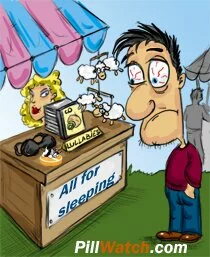
Frequently, people suffer from insomnia or inability to fall asleep or to stay asleep during the whole night not continuously, but occasionally - for one or two nights. This can be caused by different factors: a hard working day, stress or even some other disease. If such rare cases of insomnia occur, people mostly think about sleep aids that can be found easily and quickly in the nearest drug-store or even in the supermarket.
These types of sleep medications, defined as non-prescription or over-the-counter (OTC) drugs, can be bought without doctors prescription. So, taking into account that it is rather unlikely that a person will consult a doctor before buying some OTC sleep aids, it looks quite reasonable to know some basic facts about this type of sleep improving drugs.
Speaking about OTC hypnotics (medicines, improving sleep), we mostly mean antihistamines, because they are widely used as the major working agent of sleep pills nowadays. Diphenhydramine and dimenhydrinate are the most common representatives of antihistamines, used to promote sleep. It is interesting to note that the direct indication for antihistamines use is to fight cold, flu and allergy, but due to their sedating or calming effect, they are widely used as sleep improvers.
Specialists' opinions on antihistamine sleep drugs differ: some doctors say it is better to use prescription medication after careful examination of a patient, others say that OTC sleep pills are OK, when used on the short-term basis. There are also optimists, who say that rare cases of insomnia does not need treatment at all and can be successfully cured by changes of sleep habits or some natural remedies, like herbal teas, for example.
The most serious problem, associated with the use of antihistamines, is the effect of "hang-over", which often takes place the next day after taking a pill. A person may feel sleepy and drowsy; it can be difficult to concentrate. It is caused by the ability of antihistamines to stay in the human body and promote its action for rather long period of time (approx. 8 hours). That is why, OTC sleep medications should be taken only in the evening, provided that a person will be able to stay asleep for 6-8 hours.

The most common side effects of OTC sleep medications are drowsiness the next day, dizziness, forgetfulness, constipation, urinary retention, blurred vision, and dried mouth and throat.
The non-prescription sleep aids should not be used in combination with alcohol or other sedatives. Besides, people with breathing problems, glaucoma, chronic bronchitis, and difficulty urinating because of an enlarged prostate gland should avoid taking this type of medications. Pregnant and nursing women are recommended to consult a doctor before using any medication, including those, available over the counter.
Finally, it seems to be logical to give some brand names of the OTC medications, used to improve sleep. The todays market offers Sleep-Eez, Sominex, Nytol, Unisom, Tylenon PM, Sleepinal and many other representatives of antihistamines family, capable to help people fall asleep and restore their normal sleep patterns.
Nick
| Tip for you : Sign-in with Your OpenID and post faster, easier and with easy access to all your past posts. | |
|
Your Nick: |
















